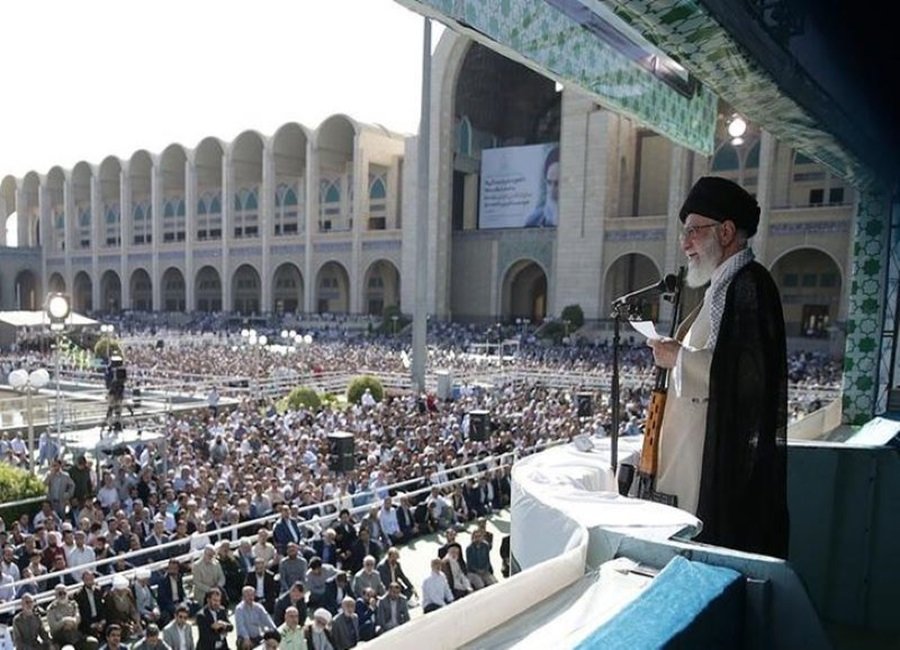A year of Israeli war in Gaza reconfigures the Ummah
Syed Akif Zaidi
THE intensity of the world’s interest in Friday’s prayer (October 4) in Tehran led by Supreme Leader Ayatullah Khamenei has been unprecedented. Media outlets and commentators, including many that are openly hostile to the Iranian state and its revolutionary ideology, vied with each other to relay and dissect the content and significance of this massive religious gathering in the Iranian capital.
In that remarkable moment, the configuration of the Muslim world appeared very different from what it is usually assumed to be. Rather than Makkah or Madinah, or any of the major Arab capitals, it was a Persian city that appeared to be at the centre of the global Muslim community, or the Ummah. In a speech heavily infused with Quranic themes, a Shia religiopolitical leader addressed not just the massive crowds of men and women that had gathered in fearless defiance of Israeli threats, but also nearly two billion Muslims across the globe, calmly urging them all to forge a united front against their common enemies.
Also present was the Iranian President Masoud Pezeshkian who had just returned from Qatar after meeting with several Arab leaders and foreign ministers a few hours after Iran’s major missile assault on Israel. At these meetings in Doha, America’s Arab allies unequivocally condemned Israel’s recent actions, and enthusiastically claimed to seek better ties with Iran. They also assured Pezeshkian that they would not allow their countries to be used to harm Iran.

Iran’s supreme leader Ayatollah Ali Khamenei giving Friday sermon in Tehran on October 4.This was his first sermon in five years. — X photo
This writer postulates that far from being an aberration, the seemingly unusual events described above are, in fact, revelatory of undercurrents that have strengthened enormously over the past year, ever since the Palestinian uprising of 7 October. It may no longer be appropriate to speak of them as undercurrents. They are now trends, and they are set to strengthen and grow further in the days ahead, precipitating rapid changes across the Muslim World, especially in West Asia and North Africa. Let’s go over some of them.
The strength of identities in Muslim societies – for example, the feeling of being primarily Saudi or Turkish for example, or that of being Arab or Sunni – has changed considerably over the past year. On the one hand, countries such as Iran and Malaysia that have openly supported the Palestinian cause have experienced a surge in national pride. On the other, national pride has frayed in some societies such as Saudia Arabia and Egypt, countries that are seen as being ruled by Israel-friendly regimes. The case of Yemen is unique; it appears its strong show of support for the Palestinians has accelerated the forging of a new shared national identity in a hitherto tribally-ordered society in which such an identity was nearly absent.
Another arena in which the Ummah has witnessed rapid change over the past year is that of the soft power enjoyed by various countries and political actors. Players all across the Muslim World have seen a rise or decline in their soft power in direct proportion to their perceived levels of support for the Palestinian cause. Thus Yemen, Iran and its allies such as Hezbollah have seen their popularity skyrocket to levels not seen before. Suspicion of the Shia has declined, and in some cases has been replaced by respect. Algeria, Turkey, and Malaysia, have fared reasonably well, as have Russia and China. The biggest decline in soft power in the Muslim World over the past year has been suffered by the USA; the decline has been so precipitous that it appears difficult to imagine that America can ever recover its earlier position of power and influence. With its uneven voting record at the United Nations General Assembly (UNGA) and its continued supply of arms to Israel, India’s soft power too has suffered, albeit to a far lesser degree.
Yet another change that has occurred at an accelerated pace over the past year is in the nature of the relationship between the masses and their ruling elites. With the exception of a few countries such as Syria and Iraq, disenchantment with the ruling class has grown sharply in many Arab countries, sometimes leading to the intensification of repressive measures and policies in those societies.
Driven by developments in the war over Palestine, these and similar trends are leading to a rapid reconfiguration of identity and power patterns across the Muslim World. Dynamics across the Ummah have shifted sharply towards greater transnational and intersectarian unity, and lesser Western influence. More than nationality or affiliation to a specific sect or ethnicity, it is the intensity of support for the Resistance in Palestine that has started to determine the power quotient of any player in the Muslim World. Thus, as Israel spreads its US-backed war to Lebanon and perhaps beyond too, the stature and influence of countries, societies and groups that confront it is set to grow even further.
In summary, it appears that last year’s October 7 attack and the immense suffering that has followed it have catalysed the emergence of a new future for the Muslim World. It’s a future in which the power and influence of countries and groups that constitute the Muslim World will increasingly be determined by the strength or weakness of their support for the Palestinian cause. Therefore, more than viewing it as an aberration, it may make more sense to see last Friday’s prayers in Tehran and the enormous attention they attracted as a glimpse of the future.
_________________
The author is an Indian PhD student at the Al-Mustafa International University in Iran. The views expressed here are the author’s personal and Clarion India does not necessarily share or subscribe to them. He can be contacted at akif.zaidi@gmail.com

